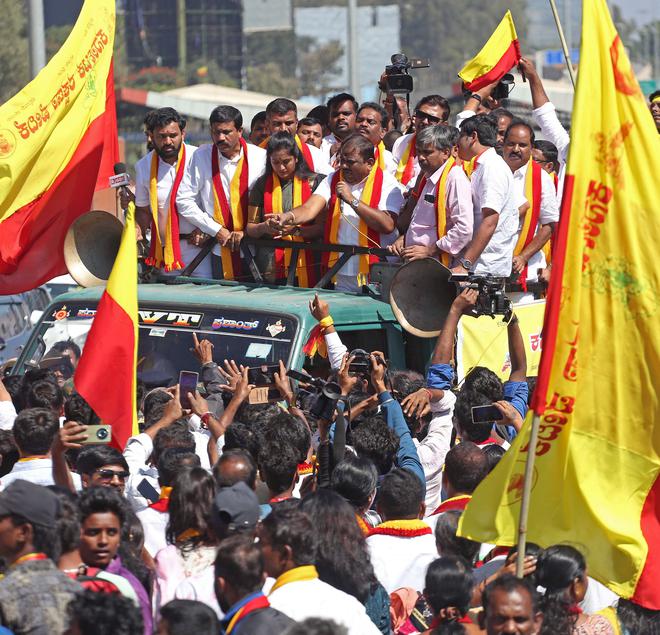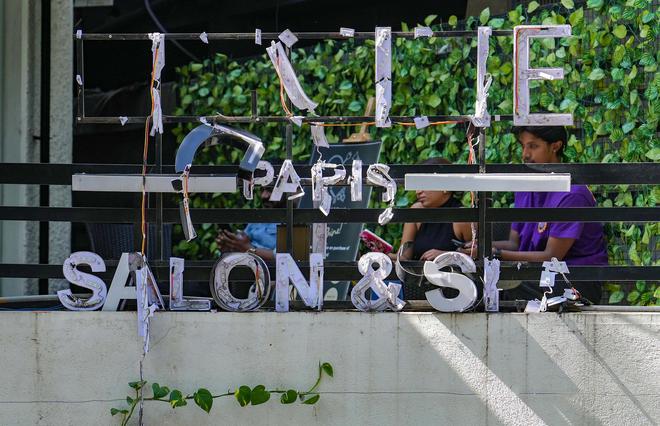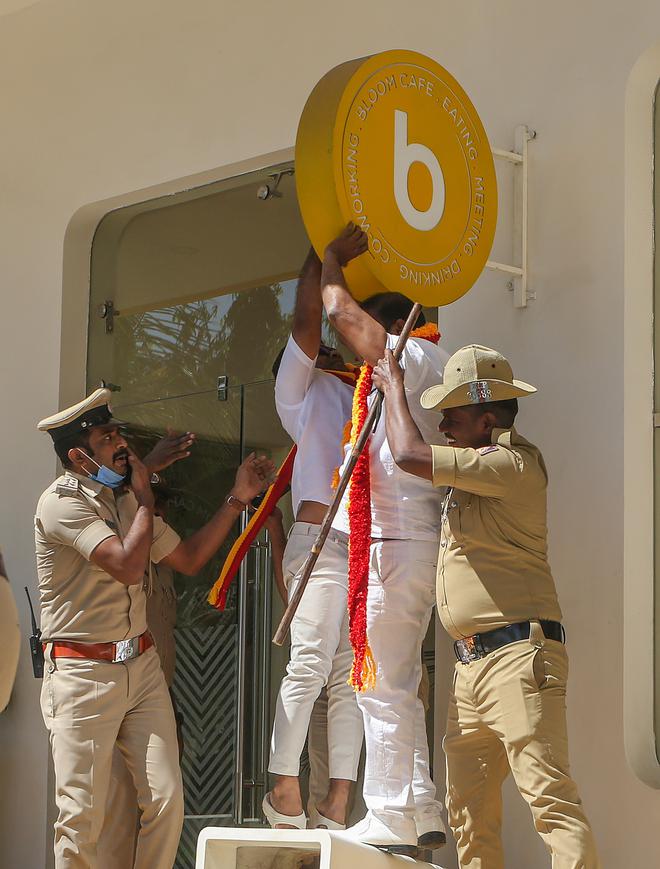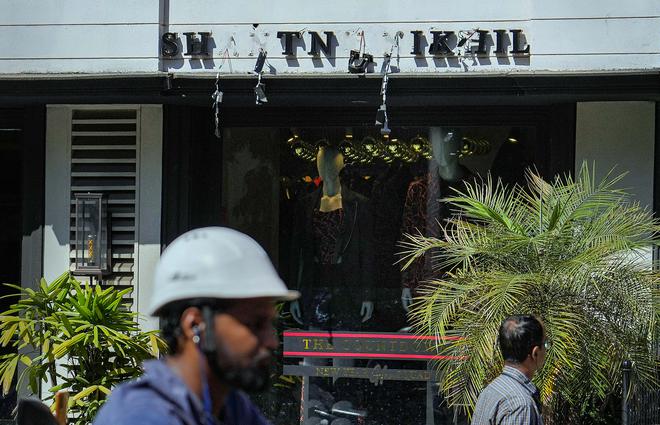The importance given to Kannada, or the lack of it, remains one of the most sensitive issues in Bengaluru, the information technology capital of India. The issue spilt over to the city’s streets again last week, on December 27. Activists of the Karnataka Rakshana Vedike (KRV) — a Kannada group that was born in the late 1990s, when the city emerged on the global stage — took out a protest march against the display of non-Kannada signboards by commercial establishments. However, it soon degenerated into vandalism of shops and signboards.
At least 50 complaints on specific instances of vandalism were registered with the Bengaluru City Police. While the protest rally was on the International Airport road and targeted the new Phoenix Mall of Asia, incidents of vandalism were reported from across the city. Groups of KRV activists were seen roaming the streets warning shopkeepers, pelting stones, and damaging non-Kannada signboards. Police drew ire for not being able to stop the vandalism.
Karnataka’s Congress government, led by Chief Minister Siddaramaiah, which has backed the campaign for Kannada signboards, went into a damage-control-mode to save ‘Brand Bangalore’ and distanced itself from the violence by arresting KRV president T.A. Narayana Gowda. Over 13 cases have been registered, and over 50 KRV activists have been arrested.
Legal hurdles to Kannada signboards

The demand for Kannada signboards in the State, especially in its capital, Bengaluru, came up in the early 2000s when the city emerged as the back office of the first world, leading to the verb “Bangalored” being coined for jobs being shifted here from the West.
The then Chief Minister S.M. Krishna, who was championing the city on the global stage, issued a circular in 2002, asking all municipal corporations to ensure that signboards and streets were renamed in Kannada. This circular did not have any legal teeth.
The issue again came to the forefront in 2008, when the then BJP government led by B.S. Yediyurappa added Rule 24 to the Karnataka Shops and Establishments Act, 1961, which said the top half of a signboard had to be in Kannada and the bottom half in any other language.
However, this was challenged in the High Court of Karnataka by a telecom service provider, Vodafone Essar South, which argued that it had spent crores of rupees on its signboards and changing them had financial implications. The court stayed Rule 24 in 2009 and struck it down in 2014.
The city’s civic body, Bruhat Bengaluru Mahanagara Palike (BBMP), issued an order in 2018 which said 60% of all signboards had to be in Kannada. The Retailers Association of India challenged this in the High Court and got a stay order in 2019.

A new law, a campaign, and now an ordinance
Following the failure of multiple attempts to mandate Kannada signboards, the Kannada Development Authority (KDA), a statutory body, included this in The Kannada Language Comprehensive Development Act, 2022, which it drafted and was passed by the State Legislature in 2022.
Section 17(6) of the 2022 law says: “The upper half portion of boards displaying the names of commercial, industrial and business undertakings, trusts, counselling centres, hospitals, laboratories, amusement centres and hotels etc., functioning with the approval and sanction of government or local authorities, shall be in Kannada and the lower half can be in any other language”.
KRV took up a campaign over the past four months demanding the implementation of this norm. Activists visited shops, malls, and other commercial establishments and appealed to them to change their signboards. When they did not receive a positive response, they took out a protest march on December 27, which turned into vandalism.
Now, the State government has decided to promulgate an Ordinance to amend the 2022 law and bring in more clarity by mandating that 60% of the signboard has to be in Kannada and the rest in any language. Chief Minister Siddaramaiah has set a February 28 deadline for commercial establishments to comply with the law.
Anxiety in establishments
The February 28 deadline for the new 60:40 rule has caused much anxiety among commercial establishments. Kumar Rajagopalan, spokesperson, Retailers Association of India, which brought a stay on the 2018 attempt to implement the 60:40 signboards rule, said this rule lacked clarity and would only give a “free pass” to vigilantes and hold businesses to ransom.

“Such vigilantism will only bring disrepute to Bengaluru, which is a global investment destination. Commercial establishments need to cater to consumers, and the only logic that drives them is consumer needs,” he said, appealing to the government to drop the idea of promulgating the Ordinance.
While many retailers oppose the mandate, they fear voicing it. “Language is a means of communication, and this rule only disrupts it by being divorced from the ground reality. The name of a shop or an establishment is also a brand name which cannot be translated easily. Bengaluru has always been multilingual and cosmopolitan, and such rules and vandalism only damage that,” one of the traders said. Officially, Kannadigas, though they remain the single largest linguistic group in the city, are a minority compared to other linguistic groups put together.
Discontentment is brewing even in Chickpet, dominated by Marwaris, where a signature campaign is reportedly underway to petition the President of India against the new norm. Sajjan Raj Mehta of Chickpet Traders Association said his Association has no qualms with the Ordinance and said anyone who does business here should respect the law of the land. When quizzed on the signature campaign, he said he wasn’t aware of it and that if he finds such traders, he will speak to them personally to withdraw the campaign.
Arun Kumar of the Malleshwaram Shop Owners’ Association said with the new 60:40 rule, it appears that many commercial establishments, which already have signboards in both Kannada and English, have to change them. “This involves considerable financial burden, and we now plan to petition Chief Minister Siddaramaiah,” he said.
The Ordinance and Section 17 (6) of The Kannada Language Comprehensive Development Act, 2022, and the February 28, 2024 deadline for its implementation are likely to be challenged in the High Court of Karnataka.
Politics over language
Presently, the Kannada signboards issue is playing out politically in the backdrop of impending parliamentary polls later this year. In his previous tenure as Chief Minister, Siddaramaiah brought to the fore issues such as the Karnataka State flag and anthem and the removal of Hindi from Namma Metro signboards in a bid to corner the BJP as the “Hindi party”.
Sensing a similar plank being developed against them by Siddaramaiah ahead of the Lok Sabha elections later this year, the opposition Bharatiya Janata Party (BJP) was quick to turn the tables and demand the immediate release of KRV president T.A. Narayana Gowda. It was also quick to point out that the law under which Kannada signboards have been mandated and are now being implemented was enacted by the BJP regime in 2022.
There is a political consensus over the Kannada language issue, even as Kannada activists complain there has been no political support for the Kannada cause. Kannada has never been a successful political plank in the State.

Arun Javagal, organisation secretary, KRV, said they were perplexed about how the government expressed its support to demands for implementing a law. “They should implement the law, not support a protest demanding it. BJP’s support is also suspect, as the party failed to implement the law when it was in power,” he said.
Countering arguments that insisting signboards in Kannada were against the cosmopolitan nature of the city, he said access to services in Kannada, be it in banks or on the streets, was a valid consumer right of a Kannadiga that couldn’t be denied to them. “Nobody is insisting the signboards be in Kannada alone,” he added. Many Kannada activists, including former bureaucrats, have pointed out that insisting on the use of Kannada in signboards did not amount to being parochial and would not affect investment flow to the city, giving the example of European nations.
Dent to Brand Bengaluru
As Hyderabad, another IT hub in South India has turned aggressive in wooing investments, and the competition between the two cities hots up, vandalism on the streets of Bengaluru in the name of language will dent its brand image, it is feared.
“How can the police not stop such violence and vandalism? Why is our Bengaluru Minister quiet? We need confidence-boosting measures from the government,” wrote T.V. Mohandas Pai, an industry leader who was formerly associated with tech major Infosys, on social media. Another civic activist, R.K. Mishra, wrote that the vandalism “certainly doesn’t reflect Karnataka’s tolerant and inclusive culture”.
Chief Minister Siddaramaiah and Deputy Chief Minister and Bengaluru Development Minister D.K. Shivakumar quickly condemned the vandalism. They called for stern action against the miscreants to plug any damage to the city’s brand image.







